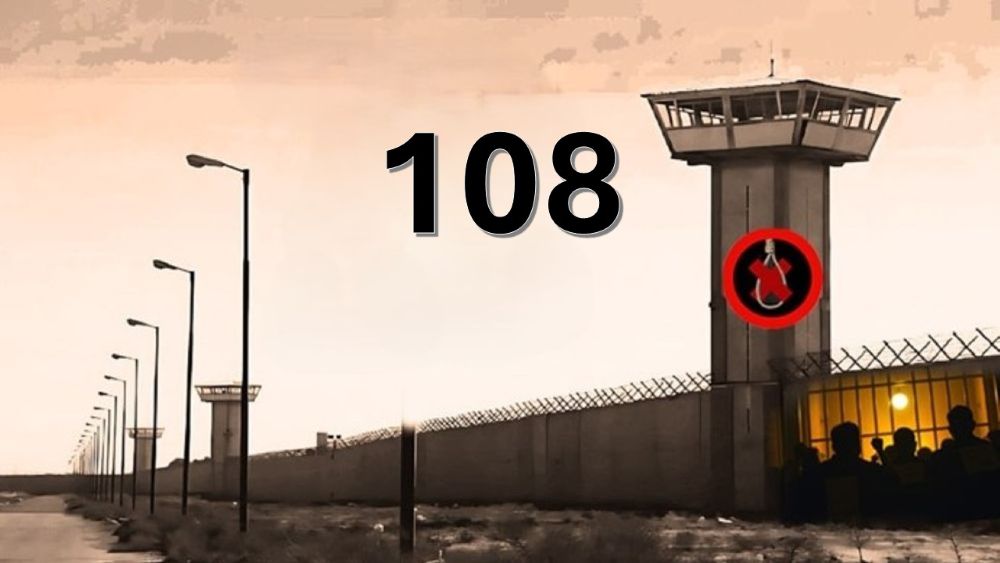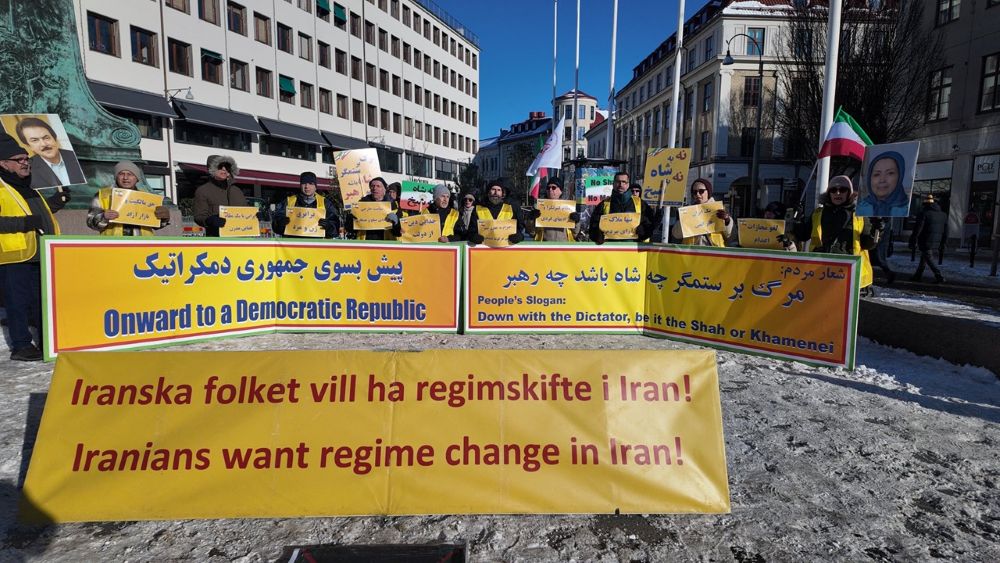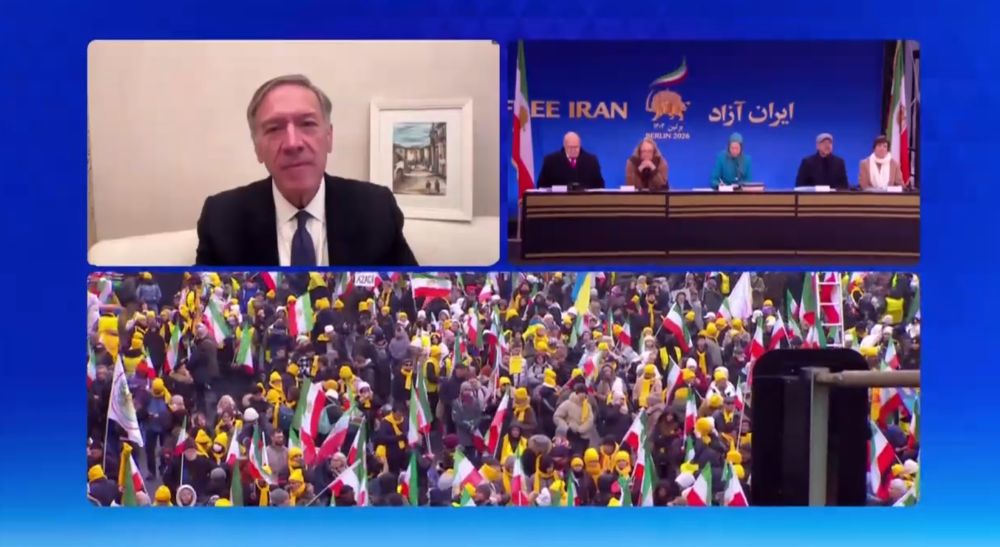Friday, August 27, 2021– The Iranian Diaspora held an online conference in which international dignitaries worldwide joined over 1,000 former political prisoners from Iran to continue the struggle in accountability call on Iran’s 1988 massacre.
Iran’s regime Supreme Leader Ali Khamenei and many current regime officials were directly involved in the 1988 massacre that continues through different.
Also, the regime’s new President Ebrahim Raisi, dubbed the “Butcher of Tehran,” was directly involved in the execution of thousands of political prisoners.
During the crime against humanity in 1988, most of those executed were members and supporters of the People’s Mojahedin Organization of Iran (PMOI/MEK).
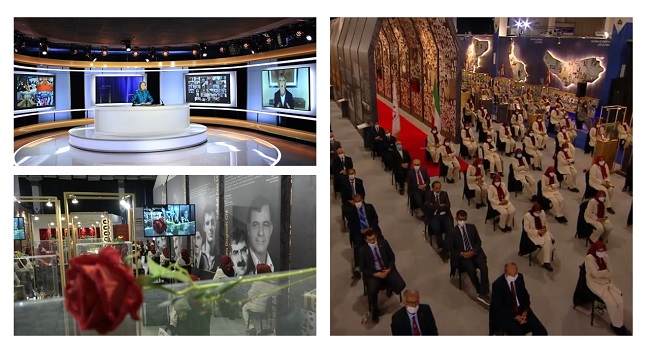
The details of the online conference are as follows:
Maryam Rajavi, President-elect of National Council of Resistance of Iran (NCRI)
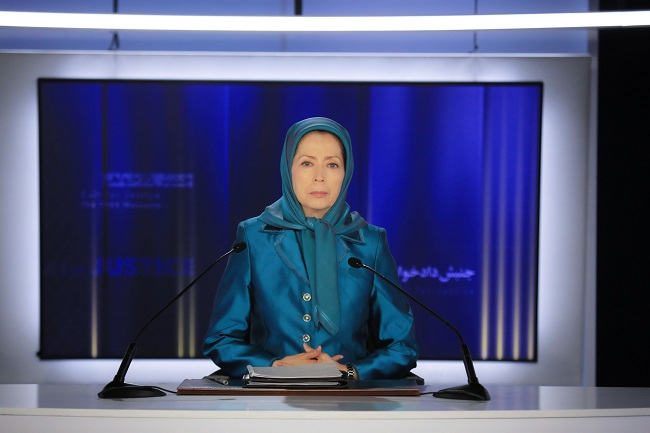
“From the onset of the 1988 massacre, the Iranian Resistance provided information about the mass executions to the United Nations. Unfortunately, they chose to turn a blind eye to these crimes,” Mrs. Maryam Rajavi, the president-elect of the National Council of Resistance of Iran, said in her keynote speech at the conference.
Mrs. Rajavi described the 1988 massacre as “a clear example of genocide.”
“Khomeini’s fatwa was an explicit decree to execute all the Mojahedin who remained steadfast… the goal of the regime goes far beyond the execution of several thousand; it is the obliteration of a generation, an ideology, and men and women who rejected religious extremism under the guise of Islam and stood up for human freedom and dignity,” she said.
Accordingly, the gathering of 1,000 PMOI/MEK prisoners is a unique capital for the Call-for-Justice movement and the Resistance movement that seeks to overthrow the regime, she added.
“The fact that such a large and valuable group of witnesses to the regime’s crimes are at the core of a revolutionary movement speaks volumes about a tremendous social reality,” Mrs. Rajavi said. “Over the past 33 years, they have continuously contributed to the Call-for-Justice Movement with their high spirit and effective presence in the struggle against religious fascism.”
Mrs. Rajavi also stressed that the ongoing rallies and demonstrations of freedom-loving Iranians and supporters of the Iranian Resistance outside a Stockholm court “are yet another glorious feature of the Call-for-Justice Movement.”
“For us, the Call-for-Justice movement is synonymous with perseverance, steadfastness, and resistance to overthrow this regime and establish freedom with all our strength. For this reason, the regime has denied the massacre, minimized the number of victims, and erased their identities in a bid to prolong its rule,” she said. “The discussion about erasing the identity of the victims of the massacre is not a partisan issue. It is the core of the issue and the critical step to undermine the principles and positions those martyrs laid down their lives for and walked to the gallows.”
Therefore, the powerful movement that seeks justice for the victims of the 1988 massacre has defied the expectation of Khomeini, Khamenei, and their accomplices, who ordered the hanging of thousands upon thousands of prisoners by executioners like Ebrahim Raisi.
In her speech, Mrs. Rajavi reiterated the responsibility of the international community in holding the perpetrators of the 1988 massacre to account.
“I again call on the U.S. and Europe to recognize the 1988 massacre in Iran as genocide and a crime against humanity. They must not accept Raisi in their countries. They must prosecute and hold him accountable,” she said.
Mrs. Rajavi also reiterates her call to the UN Secretary-General, the UN High Commissioner for Human Rights, the UN Human Rights Council, the UN special rapporteurs, and international human rights organizations to “visit the Iranian regime’s prisons and meet with the prisoners there, especially the political prisoners.”
“The dossier of human rights violations in Iran, especially regarding the regime’s conduct in prisons, should be submitted to the UN Security Council,” she concluded.
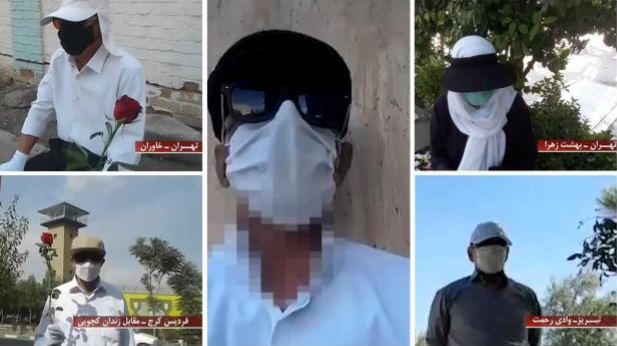
Dominique Attias, is a French lawyer specializing in personal rights, juvenile law and violence against women
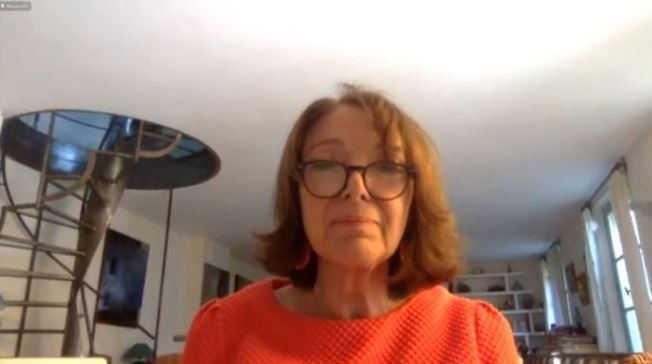
Summary of the speech of Dominique Attias in English:
This is a grave day. We know what is happening in Iran. Thanks to you and your efforts, these martyrs will be avenged. These murderers have reached the peak of their crimes. This destruction of lives of mothers, sisters, children.
This is a crime against humanity. This has to be stopped. Europeans and the entire world are silent. Today, a murderer is ruling Iran. The Iranian parliament might have accepted him, but we won’t. Iranian women will not accept him. Women are a fundamental element of the society.
If we close our eyes, we will be responsible too. The Bar Association of Europe will stand with you.
Dominique Attias speech in French:
Madame Radjavi, vous êtes l’étoile qui brillait dans l’obscurité. Aujourd’hui est un jour grave. Nous savons ce qui se passe dans un pays à côté de l’Iran.
La lumière viendra des femmes, des Iraniennes.
Grâce à vous, grâce à ces femmes qui sont à vos côtés, grâce à ces hommes qui sont à vos côtés. Toutes ces femmes, toutes ces jeunes femmes martyres. Oh ! Elles seront vengées, oui, vengées. Car ces bourreaux ont semé la mort. Ont semé la tristesse. Ont semé la désolation, ont arraché des vies. Des mères, des veuves, des enfants pleurent encore. Oui, c’est un génocide. Oui. C’est un crime contre l’humanité. Stop stop à cette lâcheté qui fait qu’on nous européens et même le monde entier se détournent.
Aujourd’hui. Un bourreau aux mains pleines de sang règne sur l’Iran. J’ai vu le Parlement. Qu’il a adoubé. Mais vous, Mais nous, nous ne l’accepterons jamais. Les Iraniennes ne l’accepteront jamais. Car la place de la femme est fondamentale et elles ont été éradiquées en 1988. Si peu de survivantes. Tant de massacres. Si l’on ferme les yeux, c’est chez nous que ça ira également. Les femmes sont ces étoiles du monde qui éclairent. Et qui toujours, toujours, montreront le chemin de la justice.
Je serai toujours à vos côtés, les barreaux européens seront toujours à vos côtés. Nous sommes cinquante-deux pour cent de l’humanité, nous les femmes. Majoritaires dans les pays, dans les barreaux. Nous sommes partout et pourtant. On n’entend pas nos voix. C’est. C’est fini. Et vous, madame Radjavi, vous êtes là pour porter si haut, si clairement, si courageusement, vous êtes la présidente de l’Iran. Et nous serons avec vous jusqu’à la fin. Portant des roses rouges, en faveur de toutes ces femmes qui ne sont plus parmi nous….
Merci de m’avoir donné la parole je serais toujours à vos côtés, toujours aux côtés des iraniennes et des Iraniens de bonne volonté, merci.
Geoffrey Ronald Robertson, First President of the UN Special Court for Sierra Leone
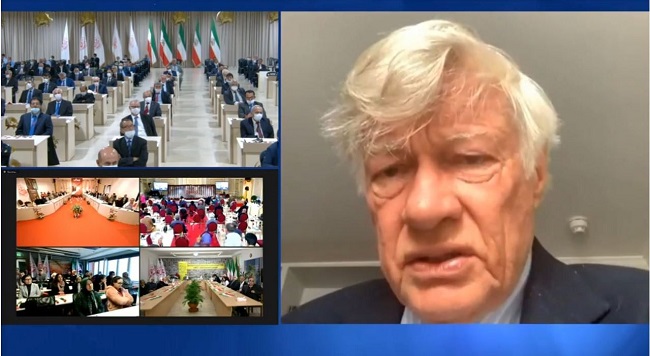
What happened in Iranian prisons, in that dreadful time in late July and August 1988. I did an investigation to the Boroumand Foundation some years ago. I interviewed about 50 survivals of those prisoners that time, and I set out my conclusions, firstly as to the facts that thousands of members of the MEK were called before a death committee and directed it once they affirmed their allegiance. They were without any trial, without any defense lawyers, without anything, they were sent by the dead committee to a corridor on the left so-called court, and they were taken and hanged.
The death committee knew, all members including Raisi knew what was happening, they knew they are sending thousands of prisoners to death. And of course, they were implemented, deliberately knowingly a fatwa issued by the Supreme Leader. Now, what was their knowledge, they knew exactly what was happening in that corridor where they directed these poor prisoners, but the question arises because it is important, this was barbaric, it was the ultimate in brutality.
But what was it in law, because what it was in law makes a difference. It was a crime; it has been a crime for centuries to kill prisoners without trail, to kill those who have been surrendered or have been in your custody. But the difference is that if it amounts to one particular crime, the crime of genocide, then there is an international convention, which bonds the countries of the world, including the United States, it was ratified by president Reagan, binds the countries, to take action.
Now, to punish that genocide, what is it genocide? it is certainly a number of other offensive, its murder, its persecution, it is various offences under international law, that set up and that created the international criminal court. But to punish those offences you need to go through a lot of groups, you need to get a resolution from the Security Council to send the case to the international criminal court, and Russia or China, or America actually … to veto.
So, it’s important to see, to analyze whether what happened to those thousands of MEK before, was properly and lawfully classed as genocide. Now in order to amount to genocide it has to be the killing of a group on the basis of their race and religion, not on the basis of their politics. We can call that politicize like that it in genocide, the genocide is confined. Stalin killed 3 million …, but he wasn’t into a genocide because he didn’t kill them to their race or religion. So it is an artificial difference, you may think, but there are two reasons for it.
Firstly, the practical reason, the race, and religion are the two factors that most usually they make hatred, hatred between neighbors, hatred between different classes of people, and particularly volatile, and also race is something you can’t help, religion very often is something you can’t help, so you can’t change. So, these are two factors that we have to see whether race hatred or religious hatred was the purpose of killing this group of MEK prisoners. Well, we have to go back to the fatwa itself to see what the purpose was, and the fatwa issued by Khomeini began this way; since the treacherous MEK do not believe in Islam, and whatever they say stands from hypocrisy, they have become renegades and since they wage war on God.
So, this is the reason, principal reason, “waging war on God”. Moharab, this is the reason it goes on, and suggest the political reasons as well, but MEK ever since its foundation, was distinguished from Khomeini’s group, because of their more fundamentalist view of Islam, and of course the MEK was more liberal, and it is quite clear, as I read this fatwa’s translation. That it was a religious reason was the primary reason why these people were killed and Khomeini went on, and this was direction that Raisi, on his own will, deliberately was following. It is naive to show Mercy to Moharabs, those who wage war on God. The decisiveness of Islam before the enemies of God is among the unquestionable tenets of the Islamic regime. So here is a bureaucracy imposing the death penalty and goes on, kill them with revolutionary rage and rancor these enemies of Islam, must be most ferocious against the infidels.
So, I don’t think there is any doubt that the order from the supreme leader, accepted willingly, by Raisi, who didn’t have to. Ayatollah Montazari was bagged him to stop, but the other members of death committee continued and of their own will to carry on, and ordered to kill on with rage and further on for basically, the reason of religion, because the religion of the MEK held to was different to that, which the theocratic state insisted upon it.
And I think it is interesting when use of these killings first came up through the United Nations. There was an attempt by the regime to defend them and it was an attempt by the then chief justice was Ardabily, and he explained to the UN, he said we are not a secular state, so blasphemy is not permitted. So, he said this was a form of punishing blasphemy and that of course is the crime of the religion having the wrong religion.
So, it seems to me that there is very strong evidence that this is genocide, and the genocide convention was ratified by Iran in 1956, under the last Democratic regime, that was overthrown by CIA and MI6, but it applies to killing or causing serious mental or physical harm to members of a racial or religious group as such. Now, it wasn’t members of a racial group, they were all Iranian, it was the members of a religious group as such, a religious group that did not accept the fundamentalism of the Ayatollah and the theocracy of this theocratic state, and it viewed as the most heinous of international crimes, it is mass murder by fellow humans, something that they can control attempting their conscious. The religious group with the Iranian regime intended to destroy where those who held a different view of Islam. And latter of course in September they moved on, and killed those who were atheist or communist or left-wingers of some form, in other words those who had denounced Khomeini’s view of Islam.
And of course, there is decision in the courts, that if you are atheist that amounts to killing on grounds of religious, even though they have non, that’s the reason. So, there is no doubt, it seems to me that there is a case for prosecuting Raisi and the others … and that is the crime which engages international responsibility, and something must be done about it as being done by the perpetrators of Serbinitsa, was the last declared genocide in international law.
So that is the…, I think, I would believe them the actual description of what went on if you look at the actual evidence and decide to classify this is genocide and then an International Convention, which requires states of the world that have signed up to it, most states have, to take action against those who perpetrated it, and one of them was the president of Iran.
Theo van Boven, Director of the UN Division of Human Rights (1977-1982) and UN Special Rapporteur on Torture (2001-2004)
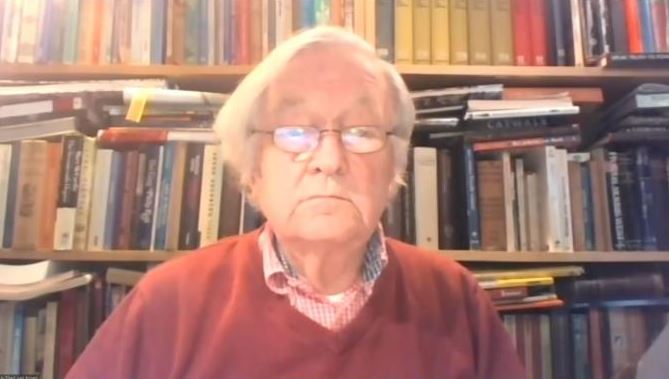
Thank you very much for giving me the opportunity to speak as a former official of the United Nations and someone made an earlier commitment to the course we are all defending. I feel … to joining this panel, that discusses the events of July to September 1988, concerning enforced disappearances of several thousand political dissidents in the Evin and other prisons near Tehran.
These terrifying criminal events calling our hearts and minds to what is stated in the preamble of the Rome, statute of the international criminal court, and I quote, “mindful that during this century millions of children, women, and men has been victims of unimaginable atrocities that deeply shocked, the conscience of humanity and determined to put an end to impunity for the perpetrators of these crimes and thus contribute to the prevention of such crimes”
Let me know elaborate briefly on the right to truth. For the purpose of this panel, it appears highly pertinent to recall the inalienable right to the truth has the right to know the truth about past events, concerning the perpetration of heinous crimes and the circumstances and reasons that led through massive and systematic violations through the perpetration of those crimes.
Full and effective exercise of the right to truth provides a vital safeguard against recurrence of violations. I can now to the recent taking office of the president of Iran, the current president of Iran Ebrahim Raisi at the lengthy career in Judiciary of his country, between 1981 and 88. He was the first prosecutor of Hamadan and then the deputy prosecutor and the prosecutor of Tehran, moving to become prosecutor general and head of the judiciary.
By holding these functions and exercising authority, large scale killings occurred, across Iran, among these, 1988 massacre of many thousands of political prisoners, putting into serious question, the road, and the accountability of Ebrahim Raisi.
And therefor the most important for this panel, we have thus to call for an independent inquiry, preferably under the United Nations auspices into the massacre of 1988 with due regard for the law, and most pertinent, the accountability of Ebrahim Raisi.
I thank you for your attention.
Kumi Naidoo, Secretary General of Amnesty International (2018-2020)
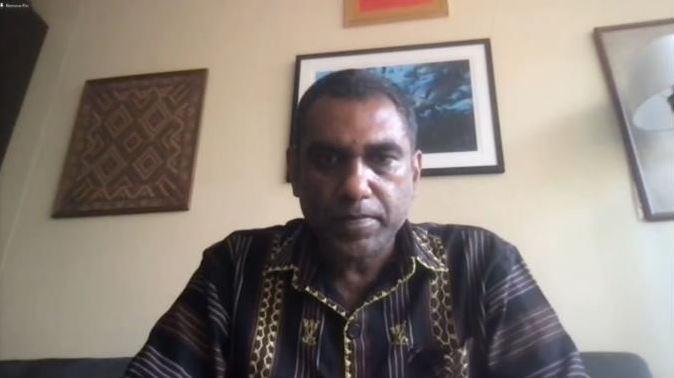
Dear brothers and sisters, I bring you greetings from Africa and on behalf of the Africans Rising for justice, peace and dignity and social movement, were I serve as … and as some of you might know, I have served as the Secretary-General of Amnesty International during which time the report was brought out on this terrible tragedy and terrible injustice that we saw take place in Iran in 1988.
So let us be very clear, what happened in 1988 was a totally brutal … massacre of political prisoners, which is a crime against humanity. And if you go with the definition given by our previous speaker, notwithstanding the technicalities it amounts to genocide.
Now as an African, where we have had many tragedies on our continent, including in my own country, South Africa. I have to say that this particular act by a state, by a government, murdering people that were in their care. Because, when you are a prisoner you are in the care of the authority that is holding you, and they have a responsibility in terms of international law to provide you with food and healthcare and so on.
They do not have the right to take you out at night and hang you. I would like to pay tribute to the political prisoners that are here with us today. It is very moving for me to see the strength and the courage of people who have been through so much and suffered so much of personal tragedies, as well as seeing friends and comrades who have had to endure some of the worst atrocities that humanity have ever seen. So, I would like to pay a tribute to all the political prisoners, the PMOI members and supporters for their steadfastness and the sacrifices their have made.
I would like to applaud you in this event that you and other speakers have taken care to say that stand for all the political prisoners that lost their lives, including those that were from smaller political parties and including those that might have had different views and those that might have been dismissed as leftists and so on.
It is critically important that in this moment of world history where we are seeing many governments running out of legitimacy to actually govern in the way that the citizens expect that we look for a new source of inspiration that is coming out from the new generation of young people across the world, from Iran to Afghanistan to the United States to Europe.
We are seeing that young people are standing up with such courage with such motivation and that is something people like myself who are older human rights activists and so on must now fully encourage and support and it has been very inspirational to see that there have been a significant number of young people in the last decade in Iran were standing up and who have been putting their lives at risk and many of whom have paid the price.
I want to stop here to make a point about how we understand how governments get away with the kind of brutality that happened in 1988. Often we think that governments control us, primarily through the use of what you could call the repressive state apparatus, Army, police …laws and prison systems and so on. Of course, that is very powerful and the tragedy of 1988 tells us about them, however, it is critically important that we understand that equally important, if not even more important, is how unjust governments use the ideological state apparatus, which is framework for Education, the framework for religion, social norms, and customs, and critically important the framework for media and communications.
So if we are to turn things around in Iran, we need to consciously think about how we are able to try to break through the control that the regime has on how it can manage the information and how it can keep so many people unaware of some of the tragedies that they have inflicted.
It is important therefore, that the European Union and the broader International Community who I must say are very selective in how they apply the commitment to democracy and human rights and that makes it difficult for them to play the role that they need to play. But not withstanding that they need to be taking the leadership given the work that has been done, the evidence and the research that is clear about what has happened now, to set up an international inquiry into the massacre and to all the perpetrators to account for committing crimes against humanity.
The EU policy in Iran need to be revised and take into consideration that this current government and has a higher level of culpability, given the particular role that played by president Raisi in the crimes committed in 1988.
I would like to conclude by saying that Governments who behave like this must recognize that their behavior is not an expression of strength. It is an admission of weakness. When you have to kill your own people with such brutality, with such impunity and with such an unaccountability, all you are saying to the world is that we are weak. Strong governments do not need to do the kind of atrocity that was committed in 1988.
But let me conclude by saying that notwithstanding all the media manipulation and control that we see by many governments, unjust governments around the world and as we have been seeing it in Iran. I would say humbly to the Iranian government as has been said before.
You can fool all the people, some of the time, some of the people all of the time. But you can never fool all the people all the time. If justice is to be served and if human rights is to be respected, let us hope that that recognition is coming soon, and I would like to just end with the word of thanks to all the prisoners that are here for reminding us that the struggle for justice is a marathon, and not a sprint and from the bottom of my heart I like to add my word of appreciation for all the political prisoners that are with us, with their courage, the commitment and for the inspiration … Not only to the people of Iran, but for the people who are fighting for justice all over the world.
Thank you very much.
Audronius Ažubalis, Minister of Foreign Affairs of Lithuania (2010 – 2012) and Member of Parliament
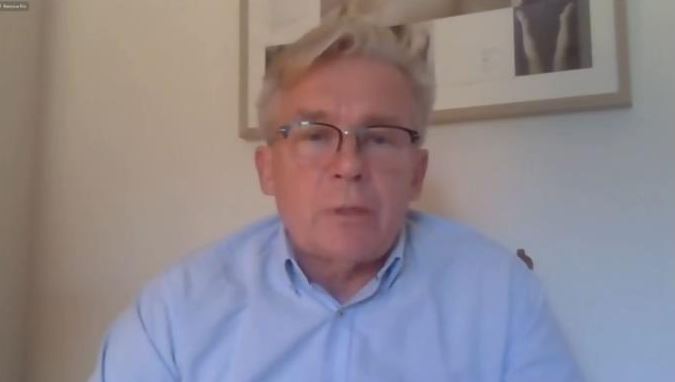
The crime that we are discussing today remains unpunished until now. And those who were responsible for it are still holding key positions in the regime ruling Iran. Khamenei, Iran’s supreme leader who was the president at the time, and Rouhani, both approved the decision — Rouhani’s Minister of Justice — over Death Committees which made decisions on executions in the 1988 massacre. Raisi, Iran’s new President, was a known member of a Death Committee, and yet, he was promoted to be the president instead of facing justice.
Amnesty International made a report in 2018 about this heinous crime titled ‘Blood-soaked Secrets.’ In June 2021, Secretary General of Amnesty International called for Raisi to be investigated for crimes against humanity.
Seven United Nations experts also asked for independent investigation of the massacre. The United Nations Special Rapporteur on Iran too in July 2021 called for an independent inquiry on the extra-judicial killings of 1988.
However, despite the abundant evidence and the witnesses of the 1988 massacre, no one has yet faced justice for this crime against humanity, and the Iranian authorities continue their crimes, including the executions with full impunity, because they see no political will and where United Nations and the Western governments over holding the perpetrators accountable. This is the main issue of the conference.
The 1988 massacre is a crime against humanity, and an international independent investigation is a must. I believe that they have to push for President Raisi to be investigated by the International Court of Justice for crimes against humanity, including murder, enforced disappearances and torture.
I just wanted to mention the EU Global human rights sanctions regime. In December 2019, the European Council, comprised of all leaders of EU member states, welcomed the launch by the High Representative of preparatory work to establish an EU regime of general scope for restrictive measures against serious human rights violations and abuses.
This was adopted by the EU a year later in December 2020 to equip itself for the first time with a framework that will allow it to target individuals, entities, and bodies — including state and non-state actors — responsible for, involved in or associated with serious human rights violations and abuses worldwide, no matter where they occurred. The framework for targeted restrictive measures apply to acts such as genocide, crimes against humanity, and other serious human rights violations or abuses: torture, slavery, extrajudicial killings, arbitrary arrests, or detentions. It will be for the Council acting upon a proposal from a Member State or from the High Representative of the EU for Foreign Affairs and Security Policy to establish a review and amend the sanctions list.
The EU decision empathizes that a promotion and protection of human rights remain a cornerstone and priority of EU external action and reflect the EU’s determination to address serious human rights violations and abuses.
Despite the above decision adopted by the European Council and despite all the calls by Amnesty International and United Nations experts for an independent International investigation over the 1988 massacre in Iran, until today the EU has ignored the crime against humanity perpetrated has in 1988 in Iran, and has shown no reaction toward it, and has not been prepared to implement its own decision in this regard.
I would like to call on the EU authorities to apply the EU Global Human Rights Sanctions regime to Iran’s tyrants and their crimes against humanity. The EU has had a long delay in adopting the above mechanism. However, the Baltic States, including my country Lithuania, introduced national human rights travel ban long before the EU. Therefore, I think Lithuania could take the lead in this regard among the EU members.
Now, I want to quote a famous British philosopher, Edmund Burke: ‘The only thing necessary for the triumph of evil is for good men to do nothing.’ These words are very important in the face of tragic human experiences and challenges. Tolerance and freedom are never stated, and for these ideas to flow freely, good laws are not enough. It takes people of good will who are willing and able to implement them. For too many years, the regime tried to hide this massacre from the eyes of the world. Ladies and gentlemen, thank you for your kind attention.
Eric David, Professor of International Law from Belgium
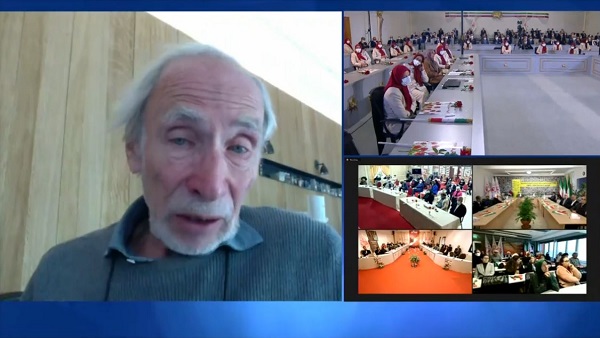
Summary of the speech of Professor David in English:
There is no doubt that this is a crime against humanity. It was an attack on a civil population. This is also a genocide because the victims were killed based on their adherence to a set of belief that was banned by the mullahs.
All international jurisdictions can try this crime. If a regime official is in any country, that country can easily accuse and try that person for his responsibility in the 1988 massacre.
We have no difficulty judicially to bring this case to court. We have to reiterate that these criminals be brought to justice in international courts.
The main speech in French as follows:
Merci beaucoup madame la Présidente, madame la modératrice, pour cette invitation à m’exprimer mais je ne vais rien pouvoir dire de très original par rapport à tout ce qui a été posé ici, mais avec lesquels je suis entièrement d’accord.
Il est évident que le crime commis en 1988 contre les 30.000 membres de l’ Organisation des Moudjahedines du Peuple Iranien est évidemment un crime contre l’humanité qui remplit tous les critères que l’on trouve depuis l’article 6,c. du statut de tribunal de Nuremberg, jusqu’à l’article 7 de l’actuel statut de la cour pénale internationale qui apparait comme étant certainement l’expression du droit international coutumier donc il n’y a aucun doute à ce sujet il y a avait à la fois le critère contextuel, à savoir ces crimes ont été commis dans le cadre d’une attaque systématique et généralisée contre population civile, des membres de l’Organisation des Moudjahedines du Peuple Iranien , et d’autre part l’élément matériel qui est constitué par un meurtre qui a été commis en l’occurrence contre ces personnes , donc de ce point de vue-là il y a aucun doute sur le fait que c’est bien un crime contre l’humanité.
Et on peut aller plus loin, et dire que c’est en effet un crime de génocide parce que ces gens ont été tués en raison de leur appartenance à un courant de l’islam qui était contestée par le régime des mollahs, c’est donc pour des raisons religieuses, pour l’appartenance à une religion ces gens ont été massacrés, ils ont été considéré comme des apostats donc ça correspond parfaitement à la définition de l’article 2 de la Convention de 1948 sur le génocide.
Donc il n’y a aucun doute pour dire que ces faits son bel et bien des faits de génocide même si le mot génocide est parfois utilisé de manière un petit peu excessive il ne demeure pas moins qu’ici, dans ce cas particulier, à particulier, des massacres de 1988 peut juridiquement parfaitement être qualifié de génocide.
Alors en ce qui concerne maintenant la création d’une juridiction pénale internationale pour connaitre ces crimes mais oui, c’est une bonne idée qu’il faut certainement encourager sans oublier toute fois que ce sont des crimes qui justifient l’application de la compétence universel et qu’autrement dit toutes les juridictions du monde sont est parfaitement fondé à connaitre de ce crime.
Si un responsable actuel du régime iranien se retrouve dans un Etat quelconque sur la planète le parquet de ce tribunal, le procureur de cet Etat, peuvent parfaitement mettre en accusation cette personne pour les crimes qui ont été commis en 1988, dès lors que cette personne apparait comme ayant une responsabilité dans ces crimes.
Donc oui bien sûr pour une juridiction pénale internationale, oui aussi pour l’exercice de la compétence universelle dans tous les états à l’égard des auteurs de ces crimes vient de soulever juridiquement aucune difficulté la seule question qui est important c’est de faire en sorte que la communauté internationale toute ensemble notamment les Nations Unis se mobilise pour appeler les Etats justement à poursuivre les auteurs de ces crimes ou qu’ils se trouvent et quel que soit leurs nationalités je pense que c’est quelque chose, c’est un devoir qui appartient à la communauté internationale qui trop souvent malheureusement s’est révèle , singulièrement muette, singulièrement silencieuse, par rapport à des atrocités, qui se passent, quelque part sur cette planète.
Voilà c’était l’essentiel de ce que je voulais vous dire en tant que spécialiste du droit pénal international et du droit international humanitaire et je souhaite bien sûr à l’organisation des Moudjahédines du peuple et au Conseil national de la Résistance iranienne de pouvoir réussir à mener à bien un combat qui a pour lui non seulement de l’égalité, mais aussi la légitimité. Merci.
Gulnara Shahinian, UN Special Rapporteur on Contemporary Forms of Slavery (2008-2014) from Armenia
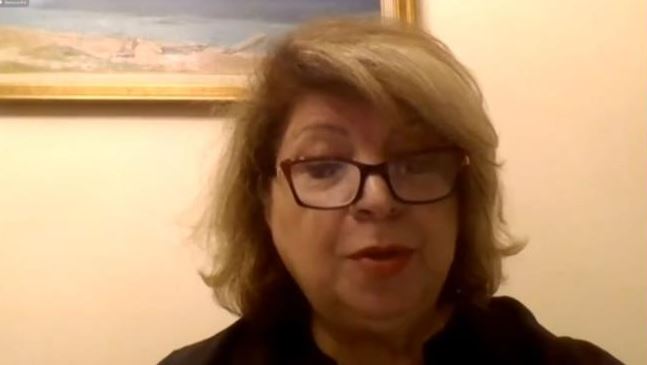
Thank you very much and for inviting me to this panel and I was very very interested to receive the voices from the field. Thank you for opportunity to view this film. Last year I was among the 152 signatories of the letter to UN seeking Commission of Inquiry into Iran’s 1988 extrajudicial executions of thousands of political prisoners. That call states that the families of the victims, survivors, and human rights defenders are, today, the subject of persistent threats, harassment, intimidation, and attacks, because of the attempt to seek information and to seek truth.
This letter brought to me many memories, stories of many people in different parts of the world, who lost their lives for their political, ethnic, religious views and identity, whose memories shaped also my history, history of genocide, history of gulags, and history of region where I live. And the current process where we are leading with attempts by some states to rewrite and distort history, and even deny memory to close the ones and descendants, and violating the most inherent right, right to truth.
Indeed, our human history is marked with massacres and then recognized the non-punished crimes where the situations when atrocities are not only unpunished, but those who committed this, are whose leadership has committed has been heroes, have become heroes in the country. And they’re remembered by the political establishment as seniors of the country, as leaders to follow.
But that’s not with people in this countries, the close ones, the relatives and dear ones who have been killed and not for humanity, as the memory of injustice of crimes and denials, forms moral history, and the delegations to seek justice. If we want our civilization to continue.
It is hard to find a region in the world that has not had mass graves, which immediate result of repression, conflict or linked to criminal activities. They may be a result of natural disasters, pandemics, but they always embody human rights violations.
Adam Rosenblatt writes in his article, the deaths on this earth, form an underground map of atrocity that stretches across the planet’s surface.
Traveling in many countries, in my capacity as special rapporteur, I was always called for meeting by mothers and relatives of those family members who have been unjustly killed for their political views, or being minority, or a religious group. And the centrality and significance of the preservation of grace of violent, and unavow for this holds deep in people’s experience, and…. of their daily lives. The emotional, personal, religious, social, legal, and historical significance of mass graves cannot be overwhelmed or overstated, for the families of who’s buried there, for the survivors, and their community for the countries concerned and for all of us in humanity.
Despite the global scale and their significance to so many, too little has been done to ensure respect to handling of mass graves. Many left un-acknowledged, unprotected, unpreserved, and even covered up, disgraded or destroyed, and mentioning that in public becomes crime.
Mass graves are places of evidence, critical to effective prospect of formal justice, the hope remains of those who denied the identity and death. There are spaces for memory for the family members. They are places for public records, proof that heinous events took place which must never be forgotten.
Especial rapporteur writes in her report, there are crimes depositories of evidence of likely growth of human rights violation in a working thus investigated and formal accountability obligations. The mass grave suggests that remains too were handled and lawfully intended to obstruct not only reparation to loved ones, but formal injustice too. In other words, a mass grave signifies commission of multiply secret crimes.
Amnesty International and other organizations in their recent report and also Special Rapporteur on extrajudicially summary of arbitral retribution expressed concerns and reported attempts by Iranian authorities to continue and destroy evidence of past violations, including the reported mass extrajudicial executions of political dissidents of 1988. Common mass grave site, which is believed to contain the remains of victims of enforced disappearance and summary executions perpetrated in 1988.
This order is the latest of the attempt to interfere with evidence of the executions, which have included bulldozing gray stones, and the harassment of relatives, such as Maryam Akbari Monfared who are seeking truth and accountability,
It is impossible to raise memory whatever cruel actions are taken. In this connection, there is a great in the role of the states, and international community is critically important. This site must be protected and staged through very responsibility for the protection and treatment of the sites. Mass graves have strong historical and educational value and special human rights mechanisms should be developed and applied to protect the sites. The respect to a lawful handling of the mass graves must be assured, an approach in which diversity of claims, rights and obligations are recognized, and in which a fair balance can be struck across those interests. The international community must do much more to support the countries and communities where the sites are located.
Current Human Rights framework should be developed in collaboration with the states to ensure respectful and local handling of mass graves, an approach in which the diversity of claims rights and obligations are recognized and in which a fair balance can be strapped across those many interests and victims of the family survivors, affected communities which are central and must be enabled to actively and meaningfully participate in decisions about management of mass graves.
All the actions to enhance and protect human rights are extremely critical now. It must be ensured that present and future generation never forget the heinous crimes that lead to this many mass graves and work actively to be sure that repetition of this violence never allowed. We always say never again, but it happens again.
We have to call to an accountability. We have to call that we cannot allow it happen again in any country of the world. Thank you for your attention.
Former Iranian political prisoner Mehri Hajinejad
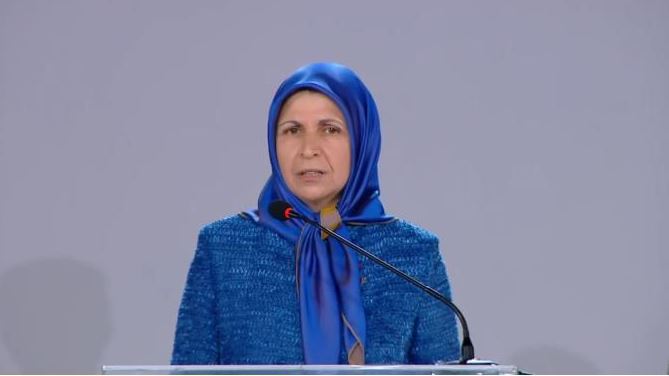
Four of my siblings were killed by the regime. When I was in prison, the interrogators tried to make us believe that we were alone. I thank all of you for your advocacy of the justice movement.
More than 1,000 former political prisoners are present here. Unfortunately, a small number were accepted in the Swedish court that is trying regime criminal Hami Nouri.
The PMOI started the justice movement immediately after the 1988 massacre began. Iranian Resistance leader Massoud Rajavi warned instantly about a massive wave of political executions in Iran as the massacre began.
Since then, the Iranian Resistance has issued thousands of statements, held many conferences, published documents and taken other measures to prevent this genocide from being forgotten.
There is no doubt that Hamid Nouri must be brought to justice. But there are also many others who were perpetrators in this case, and at the top is Ebrahim Raisi. They must all be brought to justice.
Khamenei and Raisi must be tried for the 1988 massacre, for the executions in the 1980s, for the murder of protesters, and for their murderous Covid policy.
Sima Mirzaei, relative of 1988 massacre victims with 14 family members killed by the regime
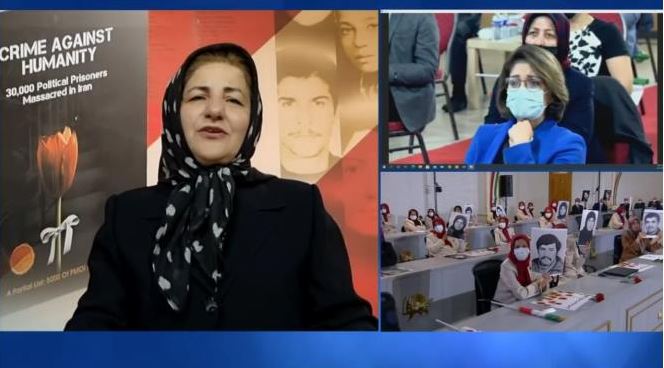
My sister, Khadijeh, was arrested in 1981 and tortured brutally for several months. She died under torture. My brothers and sister were executed in 1988 after spending seven years in prison. My brother, Hossein, spent half of his seven years in solitary confinement. My sister, Masoumeh, was tortured in front of her son.
Regime torturer Assadollah Lajevardi told my father we will burn your roots because your children are PMOI supporters. One of my brothers was 16 years old when he was arrested. The torturer told my mother I personally shot your son in the head.
After 33 years, the memory and soul of the 1988 massacre martyrs can be seen in the Resistance Units and in the justice movement. All these criminals will be brought to justice.
Franco Frattini, foreign minister of Italy (2002–2004 and 2008–2011) and European Commissioner for Justice, Freedom and Security (2004–2008)
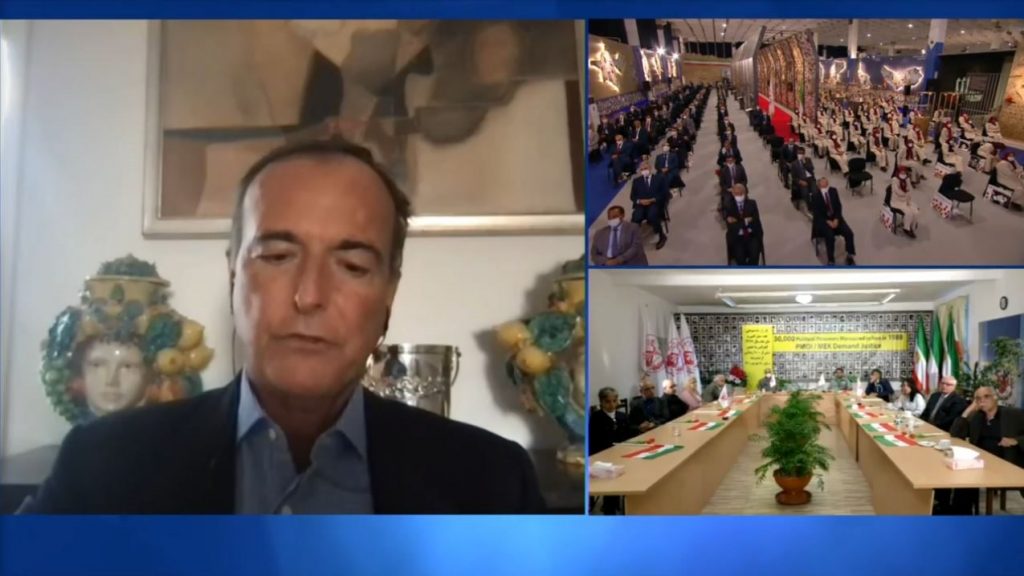
Good afternoon. Ladies and gentlemen, Madame President, first of all, very happy to see you once again, although virtually.
First of all, I’d like to pay tribute to the victims, to the families of the opponents to the regime. MEK members and supporters and all Iranians, who were and are loyal to the principles of no-negotiable freedom and democracy in your country that does not deserve oppression, repression and all forms of inequal treatment, like denying Iranian Covid-19 vaccines that are saving lives in my country and all other countries.
So full sympathy to the victims of the executions, in particular those ordered in 1988 and implemented under the so-called group of four that included designated by Khamenei as current president of Iran. Any person paying with his or her life because of a fight for no-negotiable fundamental rights is forever a source of inspiration for the new generation. Now, I would like to say something that has not been said yet.
The first action of the new government of Iran shows significant and clear continuity with the predecessors. For example, on the appointment of the new foreign minister that has served as a deputy foreign minister under Ahmadinejad, under Rouhani, then as advisor of the president of the parliament till the appointment as foreign minister under the current designated president. Could someone has doubts on the sometimes affirmed differences between the so-called conservatives and reformer? I have no doubts. It’s always the same story. It is always the same regime.
And so as confirming the new foreign minister closeness and dependence to Quds Force, when he said a few days ago, this month in August, I quote ‘in foreign policy, I will continue the path of Qassem Soleimani’, who everybody in the world knows his hands were bloody hands. This phrase is the confirmation of a key element concerning the new government and the new composition of this government.
I think, another important thing to be taken into consideration is the most blatant contradiction between proclaims and the deeds of the regime. Particularly on the 1988 massive execution of political prisoners is the following: I heard myself as a former Italian foreign minister, many statements at the openings of many General Assemblies that always the Iranian presidents have spoken on their full attachment to the UN values that first, as you all know, contemplates no-negotiable people’s rights, to life and dignity.
But ladies and gentlemen, Madame President, in practice, a regime having lost by far, the popular support applies for the rule of gun instead of the rule of law. It is a sad reality for your people, for your compatriots. As it has been said since September 2020, many requested to open finally, and they requested to the current High Commissioner for Human Rights, respected Madame Bachelet to open finally an international investigation over the 1988 Massacre. Amnesty International made a similar request, and rightly added that the current presidential role in Iran is in no way a possible justification for an exemption from the investigation.
So, I agree completely, being myself a judge, with this point of view. I wish finally an independent international investigation with no limitations linked to the role, current or former role will be opened. The same was confirmed by the respected UN Special Rapporteur on the Human Rights in Iran. So, ladies and Gentlemen, the credibility of the United Nation system is at steak now. I would be a bit brutal, but I can afford to be a bit brutal because such a tragedy and crime against humanity has taken place. Because Iran uses to act against the key value of United Nations, human rights ruled, while before the TVs at the UN General Assembly affirms the opposite.
But, ladies and gentlemen, Madam president, universal right promotion and protection cannot, and I say so also as the former European Vice President and Justice commissioner as well as the founder of the European Fundamental Rights Agency, I say: a right promotion does not belong to the arbitrium of the party concerned.
We need independency in the investigation. Iran obviously will never accept the rules of the UN International Criminal Court for crimes against humanity. But this is why the United Nation Security Council has, in my personal view, first, a moral duty. UN owes its moral duty to the innocent victims. And the duty is to try to send the case to The Hague Court. Let’s seek for Justice. If that would be proved impossible, at least let’s go ahead now with the serious investigation international investigation.
Of course, this never never never will bring the victims resurrection, unfortunately. But ladies and gentlemen, the UN credibility would be in this case tremendously stronger and the same applies for our Europe, for my country Italy for our Europe. We used to go ourselves the length of rights. It is the right moment to show that to the rest of the world now. Thank you very much.
Guy Verhofstadt, Prime Minister of Belgium (1999 to 2008), Leader of the Alliance of Liberals and Democrats for Europe from 2009 to 2019
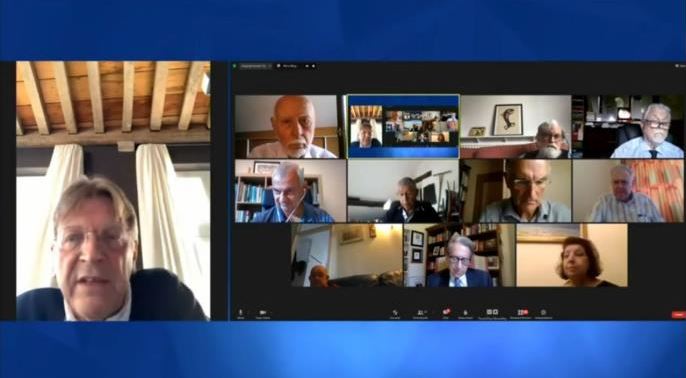
Thank you. And I want to thank you for this opportunity to speak at this occasion and I especially want to thank the speakers in the first round and a specialist that we had on human rights in the first round, because I think that they have given a useful and also a valuable insight on this massacre of 1988. Especially, I think that professor Robertson and Mr David have illustrated that this is not only a crime against humanity, but that all the conditions are there to qualify the massacre of 1988 as a genocide. And I think that could be a very important conclusion of this conference. The fact that every one of these distinguished professors and specialists on human rights are clear and saying that this is genocide.
Also, I want to send my deepest appreciation to the testimony we heard today from surviving families of those who have been murdered, because we are still, I am still shocked by what happened in 1988 in the Islamic Republic of Iran. And the reason why is because these people whom we are talking about, mainly young people, had no chance to hide themselves, had no chance to flee from their torture. All these people were already locked up. All these people were already deprived from their freedom. All these these people were already jailed and convicted by so-called revolutionary court. And it’s because of this fatwa of Khomeini that these people, already in jail, were tortured, interrogated in inquisitional sessions by the so-called death commissions, and almost hanged immediately.
What is so special to the massacre of 1988, I think is that it was targeting a whole generation of young people and young women and I think there is truth in that in was already planned years in advance, what happened in 1988. And what happened in 1988 is the consequence of the Iranian regime itself. The fact that the Iranian regime always tries to silence one or the other way, in the most brutal way, those who are asking for improvement of human rights, those who are asking for freedom, or even those who are asking for the sustainable solution for water. Also, that is deemed by the regime as an attack on the regime.
So I think that the 1988 massacre was planned. It was rigorously prepared. It was gruesomely executed, and yes at breakneck speeds with a clear target group in mind, and therefore I think Mr. Robinson and Professor David are right to qualify it as genocide. I want also to pay tribute to the victims by a short moment to imagine together here in the conference, the situation that if these murders had never taken place. Imagine that instead of this mass slaughter, all these people, many of them were teenagers, many of them were in their early twenties, had regained their freedom. That these people were not slaughtered, and these people, talented and driven men and women, found the opportunity to rebuilt their country, raise their children, start a business, cast a ballot in free and fair elections.
Then I think that without that Massacre of 1988, there would be a totally different Iran today. And so this Massacre of 1988 has a deep significance I think for Iran. And it has been done already, but I want to recall it. The anniversary of the 1988 state massacre is not to mourn those who are slaughtered, it is simply also to remind what price has been paid for freedom and for the fight for freedom. And we have to recognize, and it has already been said, but I want to recall it, that after the massacre, the International Community has, let’s say it again, failed to act over this crime against humanity.
We all know, it has been said, but I repeat it, the events of December of 1988 were never officially investigated by the UN, and as we know the instigators and the perpetrators were never indicted and far worse, we have to say the perpetrators continue to enjoy impunity and today the regime is run by the killers of that time, occupying senior government positions, including the new president, Raisi, who we all known his track record on human rights violations and who plays as we know a leading role in this massacre.
I think that the only benefit of, I cannot say election because it was not a fair election, but the promotion, I will say, of Raisi to the presidency, is that maybe for the first time, it has drawn the world’s attention to that massacre again of 1988 and to the many long-established patterns of human rights violations and murders in Iran. And I think that it would be good also that we express our gratefulness to all the journalists, activists, and social media, and human rights defenders, that in the last month, since the promotion of Raisi, have reminded the world of this man’s litany of abuses and crimes that run like a thread and tear at his dubious character.
We should also, and I want to go a little bit into detail in this, be grateful for the case of Hamid Noury, who is standing trial in Stockholm for war crimes and murder in connection with the hardest prison massacre. As we know it is the first time that a member of the so-called death commission is facing prosecution and hopefully, this trial will not only reveal details and names of what happened, but also be an example for other countries to a put people before a court. Because let’s not forget, that in many countries in the west and in many European countries, in the existing law in the existing legislation, there is already the possibility to put people that are suspected to be perpetrator of crimes against humanity before their courts.
Before their own course, as it is the case now in Sweden. So what Sweden is doing, what the court in Sweden is doing is an extremely important example that needs to be followed up at the same attitude in many other Western and European countries. Because in their legislation today, there is already the possibility to put perpetrators of crimes against humanity before their courts, even when the facts have not been done on the soil of the European or western state. But nevertheless, I agree with the general appeal today in this conference, that we need a profound official International investigation. Because we cannot tolerate the fact that impunity continues, and we must not delay it any longer.
It’s high time, 33 years after the tragic events, to fully uncover the scope of the massacre, and it’s our moral duty to do so. Because if we fail to do so, we remain not only blind to the terrible atrocities committed by this regime, but I think it is even more important, we remain blind to the endless grief of the affected families, and the survivors. For them this continues, this tragedy, and this tragedy can only end when those who were responsible are sanctioned, are convicted. And not launching an official inquiry on an international level implies also that we open the door of impunity to every other regime where torture and murder are common practice, and failing to carry out an official investigation under the auspices of the UN would result in fact in inviting all malice regimes, where human rights are trampled, to continue their practices, to continue their violence against their own people.
So, we need urgently this official inquiry and for what was possible after the genocide in Rwanda, and after the civil war in the former Yugoslavian Republic, must also be possible for the massacre in Iran. It was possible in Rwanda. It was possible for the former Yugoslavia Republic. An official inquiry under UN and followed by the installation of an international criminal tribunal.
I think that Europe has a special role to play in this. We always talk about human rights. We have to live up to our promises. And we, as Europe, have to be a catalyst for speeding up the process for an official inquiry in this. And therefore, I will take an initiative and I want to announce here in this conference to send a message, letter, officially to Borrell, the high representatives of the Union for foreign affairs and security policy, requesting him to submit, in the name of Europe, an official request to the UN for the establishment of a commission of inquiry into the massacre and to seek support for that request from other democratic governments like US, Canada, Australia, and Japan, to take up this course. I think that is what we need to do on the European level. Not only words, but an official request by the European Union to the UN, for the establishment of that.
So I conclude, three decades after the 1988 prison massacre in Iran, it is absolutely needed to do that, and we need to do that for the sake of Iran, for the sake of democracy and freedom in Iran, but especially for their families. So that they finally know where their relatives are buried, that the victim receive their rightful place, and that impunity for crimes against humanity will finally be brought to an end, and that will be the best way after 30 years, for them to conclude their long period of mourning. Thank you, Mrs. president.
Giulio Maria Terzi, Foreign Minister of Italy (2011 – 2013)
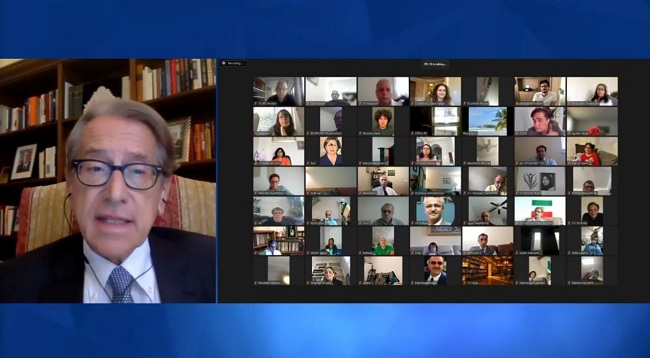
Thank you very much. I like very much to thank President-elect Madam Maryam Rajavi for this invitation and to congratulate her for convening this very important meeting, attended by significant personalities, very distinguished personalities and guests. The clips that we have just going through are providing an incredible evidence of the horror of the Iranian regime. That is why this meeting is providing elements, opinions and input at a very special occasion to encourage once again the international community to finally bring to justice those who are responsible for the 1988 Massacre.
It is important to know that this meeting is attended by 1,000 former political prisoners of the clerical regime. All from this movement, the MEK and the NCRI. Many of these former political prisoners were in jail for 10 to 15 years or more and 30% of them are women. Many of them are carrying horrible signs of torture on their bodies; many of them, have one or more members of the family and even 10 members of their families executed, and they all are witnesses of crimes against humanity committed in 1988 by the regime.
The memory of the martyrs of the 1988 massacre is, therefore, very much alive today and is becoming more forceful every day, every day. The massacre does not only belong to the past of this criminal regime. It is one of the most significant and marking references for Iran’s present, and future history, because more than 30,000 political prisoners have been executed, over 90% of them were active members of the MEK. All of them, had been summoned in front of the death commission, but none of them bent on their loyalty and commitment to the MEK. They knew exactly the had a price, they were going to pay, but they chose to stand tall by refusing to renounce their affiliation with the MEK.
Let me also remind the prominent figure professor Kazem Rajavi cowardly assassinated while he was in Geneva and he was bringing to Geneva the evidence and the consideration, the need to react to this heinous crime of 1988 and to bring this crime under the lights of the International Community. But nowadays, his powerful the mission, the mission that was pursued in Geneva by professor Rajavi, for which reason he was killed by the regime, this powerful mission is joined by many more voices of politicians, experts, members of the civil society from all over the world.
Now, it is the time to close ranks against this inhuman and bloodthirsty regime in which in the recent sham election as president of a mass murderer, like Ebrahim Raisi, has really crossed the line. Let me recall the words of Mr. Janez Jansa the Slovenian Prime Minister when he addressed the Free Iran World Summit 2021, and I quote: “For nearly 33 years, the world has forgotten about the victims of the massacre, this should change. A UN led commission of inquiry is of crucial importance to shed light over the horrible 1988 massacre. Families of the victims seek a commission of inquiry, so they could finally obtain Justice and closure.”
While the lobbies for the Iranian regime are now attacking Prime Minister Jansa for supporting a UN inquiry into the massacre, the Slovenian Prime Minister’s call has gathered strong international support both in Europe and in North America. In particular, a group of European lawmakers in a letter that have welcomed his position. The former Canadian foreign minister John Baird pointed to the moral leadership and courage of Slovenia, and in the U.S. former Attorney General Michael Mukasey said Slovenia should wear the wrath and criticism coming from Tehran as a badge of honor.
Let me say that as a former Foreign Minister of an EU country, Italy, I believe Prime Minister Jansa’s call for action was the most responsible act by a sitting European prime minister in defense of accountability justice and the rule of law against crime against humanity that has gone unpunished. At the same time, I don’t have choice here but to stigmatize the high representative Joseph Borrell for his attempt to distance himself from the Jansa declaration, by emphasizing that the comments by the Prime Minister comments at the Summit were “most definitely not a reflection of the EU position.” But I only note that EU officials have a legal obligation to condemn the violation of human rights. The long-standing position as a leading example of human rights are at stake.
Not only Prime Minister Jansa called for a UN inquiry. On June 20, 2021, current UN human rights rapporteur for the situation of human rights Javaid Rehman called for an independent inquiry into the massacre and role played by Raisi as Tehran deputy prosecutor. On May the 3rd this year, more than 150 former UN officials and renowned international human rights and legal experts wrote to the UN High Commissioner for Human Rights, Michelle Bachelet calling an international commission of inquiry into the Massacre. The signatories include former UN High Commissioner and Irish President Mary Robinson, former UN Deputy Secretary General, 28 former UN Special Rapporteurs for human rights and chairs of previous UN Commission of Inquiry into human rights in Eritrea and North Korea.
Furthermore, Amnesty International Secretary General Agnès Calamard said on June 19, 2021, “That Ebrahim Raisi has risen to the presidency instead of being investigated for the crimes against humanity of murder, enforced disappearance and torture, is a grim reminder that impunity reigns supreme in Iran. We continue to call for Ebrahim Raisi to be investigated for his involvement in past and ongoing crimes under international law, including by states that exercise universal jurisdiction.”
In light of this, High Representative Borrell should end his business-as-usual approach to the Iranian regime led by mass murderers. He should strongly encourage other EU member states to join Slovenia, instead of distancing himself from Mr. Jansa’s declaration. He should encourage all EU member states to join that statement by Prime Minister of Slovenia in demanding accountability for Iran’s greatest crime against humanity.
The very questionable approach shown by the High Representative of the European Union raises serious concerns. First of all, on the one hand he has blamed the Iranian regime as a threat to international peace and security together for its support for the militias and non-governmental military forces, while he was referring to the drone attack on an Isreali tanker in the Persian Gulf sometime ago. On the other hand, he did send his emissary, Mr. Enrico Mora, to the inauguration ceremony of President Raisi, legitimizing one of the major officials responsible for terrible crimes against humanity.
There are thousands and thousands of people out there expecting a much more assertive response by the international community, in particular by the European institutions, to the malign activities of the mullahs’ regime instead of practicing appeasement that we have seen until now. Now is the time to change course. Our call and that of thousands of innocent victims’ families mut no longer be postponed. Thank you, Madam President.
Prof. Valeriu M. Ciucă former Member of EU Court of Justice from Romania
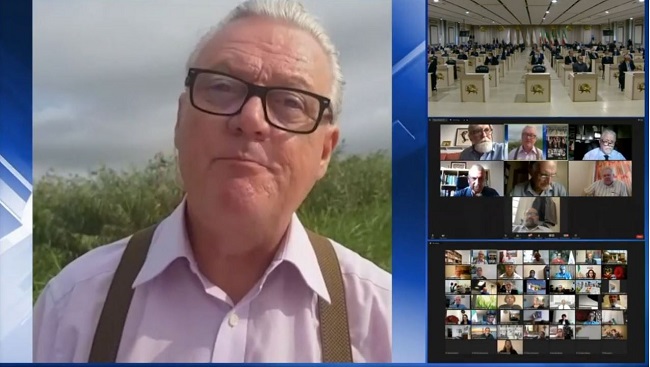
I am a former civil-military and European Judge, and now University Professor teaching Roman law, comparative private law and philosophy of European law in Romania and other universities of abroad at all levels, license, LLM and PhD studies. I am confirming by this intervention in this honorable panel of the webinar conference concerning the possibilities and the necessity to create an International independent organism and even tribunal for investigation of the 1988 massacre in Iran.
The fact that following a long way of the affirmation of the principle of the imperative of Justice concerning the crimes against humanity, I have signed beside the other colleagues and all special personalities the famous appeal of 3 May 2021 addressed to United Nations High Commissioner for human rights, Michelle Bachelet, calling for a commission of inquiry into the 1988 massacre.
I think the Iranian government has to answer any question raising from all the allegations regarding the massacre, starting from the tradition of Roman law principles in procedural law: “He who remains silent, when he is accused, in fact admits the allegations what it junctions.” In the European continental law, but also in the Islamic law, the Tacitus consensus is still preserved.
So, to avoid other presumptions, I think it is the time to start this process. I’ve sustained this imprescriptible procedure, even concerning the crimes against humanity, during the 1989, anti-Communist Revolutions. By an article published few years ago in the ancient and important Romania review, Literary Conversations, I’ve sustained even the continuation of a necessary process of communism in the cases similar to Iranian 1988 massacre.
As in the cases of the dangerous corruption, see Afghanistan today, we believe in the imprescriptibly of all crimes against humanity. It is the time for international action because we all we have enough empathy for the victims and their relatives and friends.
Don’t forget, the justice is a universal value, principle, and ideal. It is a unificatory juridical principle to eliminate the privilege of the impunity and public abuse. Thank you and success for all of us.
Parvin Kouhi former Iranian political prisoner
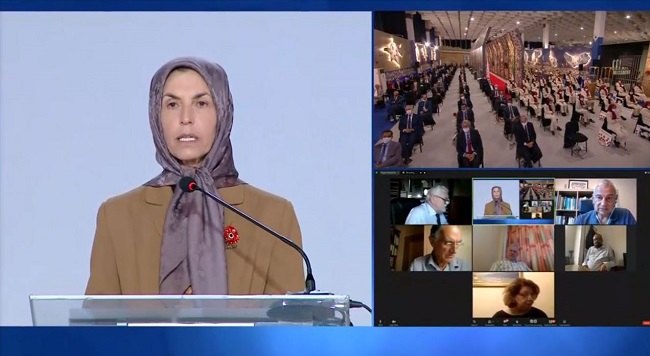
During my time in prison, on some nights, up to 600 people were executed per night. The massacre took place in all cities of Iran. In Dastgerd prison, when I returned from solitary confinement, I was surprised of the small number of prisoners left. They were all executed. The guards implied that all prisoners were executed.
Dr. Khadijeh Ashtiani former Iranian political prisoner
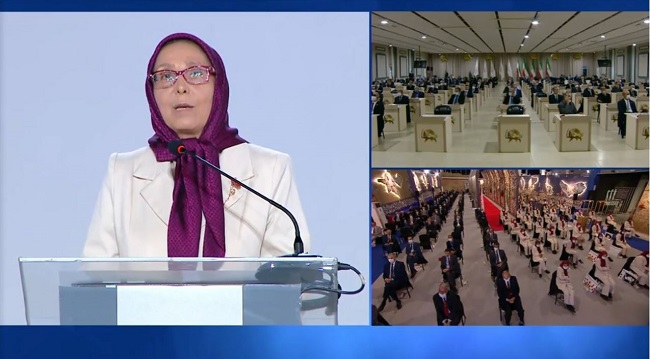
I was in prison for five years, in Evin and Ghezelhesar. I personally saw Hamid Nouri during my time in prison. The regime killed my brother in prison.
He was only 19 years old when arrested and the executed in 1988. The massacre was planned in advance. Family meetings were suspended. Prisoners were transferred to Evin.
One day, they told us to collect my brother’s belongings. He was executed.
John Baird, former Foreign Minister of Canada
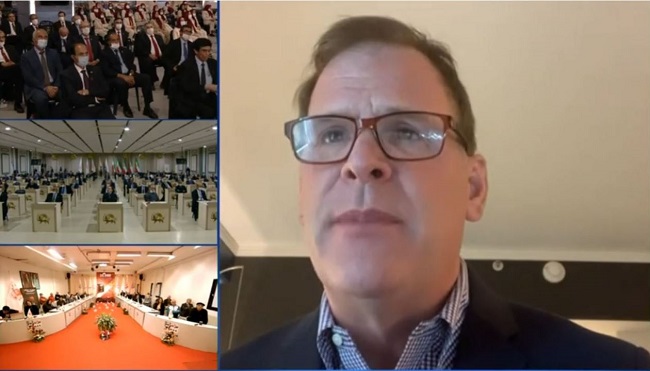
I want to give a special Hello to all my friends at Ashraf 3, to all my NCRI friends around the world, a special hello to those NCRI supporters, those supporters of freedom, democracy, and human rights, and the rule of law who are inside Iran now. Let me tell you, Canadians stand with you in your struggle.
While we believe in a whole range of values in Canada, two important values we have here are impunity and accountability. We’re not here just to commemorate the courage and the sacrifice of 30,000 people who were killed by this regime in 1988. We’re here to recommit ourselves to calling out what happened in 1988 for what it was. It was a massacre. It was a crime against humanity.
All it takes for evil to succeed in this world is for good people to do nothing. And that’s why it is so essential that we call it out for what it is and that we seek justice for those courageous people who gave their lives in the fight for a better Iran.
There is no doubt that the executions that took place in 1988 were purely based on a fatwa by the ayatollah targeting political prisoners, 90 percent of whom were affiliated with the MEK and now the NCRI.
Three-member death commissions acted in a brutal way, and this is an important part of the history of Iran. But let’s be very clear it’s not all about history. It’s about things going on today because far too many people who have blood on their hands and have continued to have rolls as prosecutors as judges and a senior people in the government of Iran. And no one has more blood on their hands than the man who currently presents himself as the president of Iran, Ebrahim Raisi. The continued of human rights defenders today that are subject of huge threats of harassment, intimidation, and attacks on them, just for trying to seek information and justice and wanting to know the whereabouts of their loved ones and their final resting place is truly disgusting.
Positions of power must be held accountable for what happened in 1988 and the failure of the international community to confront this can be resolved by the United Nations, by the European Union and like-minded friends and allies of the Iranian people to go after those that are accountable, because if we fail to go after them, they will only be emboldened to do it again.
And we know how the Iranian government operates. Its support for international terrorism in every corner of the world, atrocious, its human rights record in Tehran and throughout the country, its nuclear program, its abysmal handling of both the economy and of this Covid-19 crisis; they cannot be emboldened. We must confront this evil and call it out for what it is: a genocide and a crime against humanity. And we must not let Raisi show up in any international forum where he doesn’t face accountability for what happened in 1988.
I was particularly struck when I learned about the courage that political prisoners showed when they had an opportunity to disavow their support the value we all share, they stood firm, showed great courage and spoke out and would not repudiate what they stood for, and we got to show the same courage in commemorating their sacrifice and fighting impunity and fighting for accountability. The paid a high price in fight for freedom, and we need to do the same. I believe there is hope for the people of Iran.
Whether it’s students, whether its unions, whether its women groups, whether its academics, whether it’s the human rights defenders, whether it’s a huge amount of support that the NCRI has gathered around the world, there is huge hope. But let me tell you that the NCRI, the activist, whether in Ashraf 3 and every corner of Iran and friends all over the world are ready to continue the fight for human, rights, for freedom for dignity, and that we must show great resolve. And finally, I think we need to acknowledge the leadership of the NCRI. Madam Rajavi, we pay homage to you with the homage to your 10 point plan to change Iran.
We pay homage for your leadership and fighting for impunity and for accountability. We pay homage for your courage in the fight to hold the Mullahs accountable to hold those who involved in death squads, those how involved in crime against humanity, accountable.
People will remember, the Iranian people will remember when they get Freedom one day, who stood with them, and, Madam Rajavi I am so proud to join Canadians from so many different walks of life, so many different political parties to come together to join you in your struggle for the values and agenda that you have put forward. Let us we commit ourselves to fight Raisi.
let us commit ourselves to push against the impunity and fight for accountability and let’s hope that one day we can all meet in Tehran where the Iranian people can reach their full potential and live in a genuinely a prosperous free country. Thank you so much for having me present from Canada. I salute all of you, particularly all my friend at Ashraf three. Thank you very much and again greetings from Canada.
Dr. Javad Ahmadi
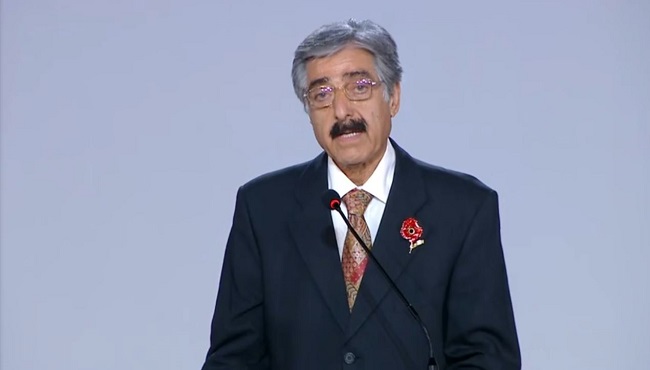
My sister, Ashraf Ahmadi, was arrested by the Shah’s security forces, tortured in prison, and released in 1979. She was arrested again by the mullahs’ regime in 1981 and transferred to Evin prison, where she was brutally tortured. She was hanged with other prisoners in the 1988 massacre.
The mullahs wanted to destroy the PMOI’s memory with this massacre. These martyrs prevented them from doing so.
Nezam Mir Mohammadi, lawyer and former political prisoner
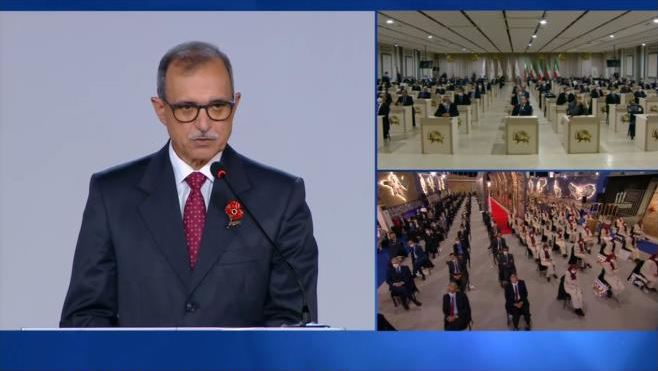
I spent 18 months in the regime’s prisons without trial. Before my arrest, as a lawyer, I was seeing to the MEK members’ legal cases arrested by the regime. In Gohardasht prison, I witnessed brutal torture.
As a lawyer, it is my duty to pay tribute to all those who lost their lives and all the prisoners who sacrificed their lives. And I thank all those who are helping to hold the perpetrators to account.
Azadali Hajilouei former political prisoner
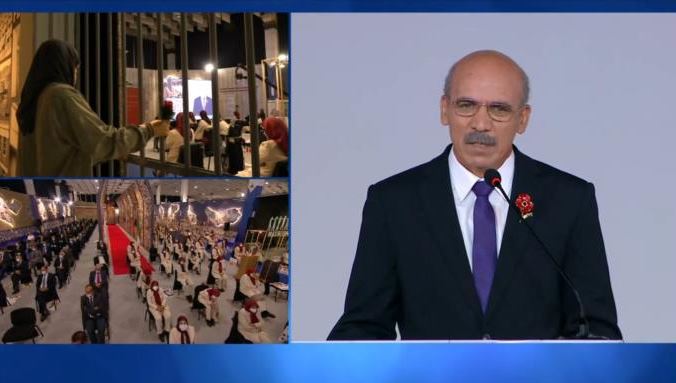
I was arrested in 1984 for supporting the MEK. I spent several years in Evin and Gohardasht prisons. During the 1988 massacre, one day I was sent to the death commission. I was then kept in the death corridor. During this time, Hamid Nouri, who is now on trial in Sweden, read out the names of thirty prisoners, including some of my cellmates. I later learned that they had been executed. I was kept there until midnight and then sent back to my cell.
One of the prosecutors told me that I should have been executed and sent me to a cell where I was told to write my will. I was then sent to solitary confinement. I was kept there for 20 days. When the doors opened, the prison guard tried to intimidate me and told me that if I did not renounce my support for MEK, I would be kept in solitary until I died. They also sent a note to my family and told them that I had been executed.
Abulfazl Mahzoon, former political prisoner
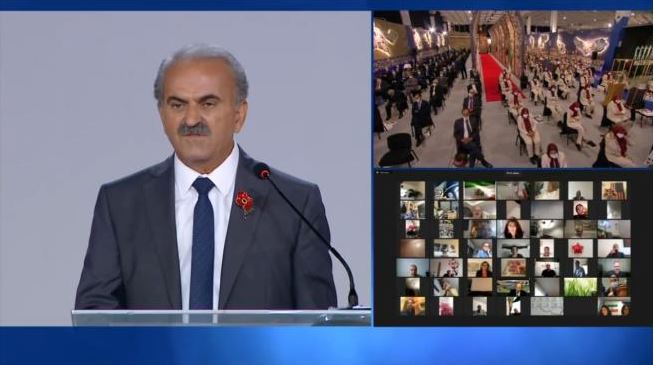
I was arrested in 1981, sent to Evin prison and sentenced to ten years behind bars. In 1986 I was transferred to Gohardasht prison and the next year, sent to Qazvin. During the 1988 massacre, a delegation came to the prison and started asking questions and inspecting our belongings.
Sometime later they came and took away several prisoners and transferred them to Gohardasht. We later learned that they were taken for execution.

